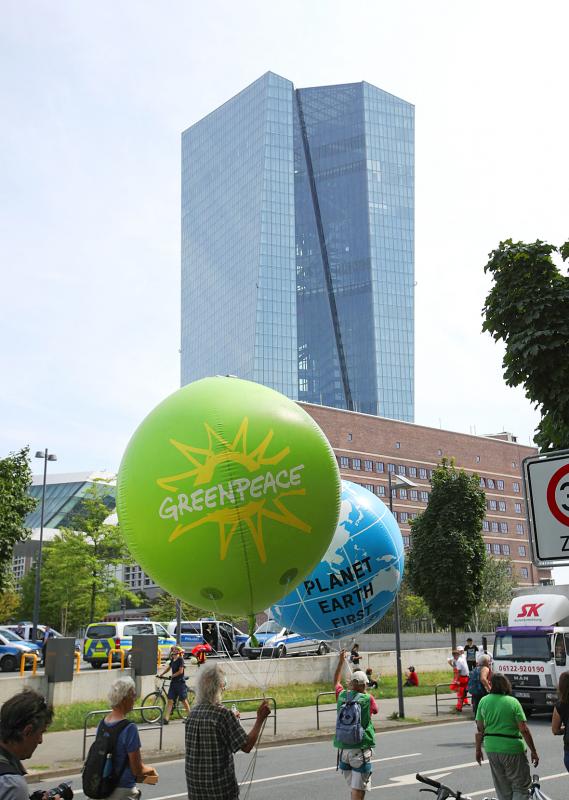The European Central Bank (ECB) is stepping up pressure on lenders to prepare for stress tests next year that would show how vulnerable the industry is to climate change, people familiar with the process said yesterday.
The ECB, which earlier this year voiced displeasure over finance industry efforts to respond to climate risks, has sent out confidential documents to banks stating that they would need to provide data on how their balance sheets might fare through 2050, the people said.
The regulator also plans to study the link between profits and carbon risk in banks’ portfolios, they said.

Photo: AFP
European politicians want banks to become a key plank in the fight against climate change by steering capital away from polluters.
Companies in the region, unlike their peers in the US, tend to rely more on their lenders than on capital markets for financing. Investors are taking note as banks burdened by carbon-intensive loan books might face higher capital requirements, which could erode their power to pay dividends.
A methodology for banks might be introduced next month, one of the people said.
Banks would have to supply the ECB with information that shows how their portfolios might evolve over periods of 10, 20 and 30 years, said the people, asking not to be identified as the documents are private.
An ECB spokesman declined to comment.
The power of EU environmental, social and governance (ESG) standards to disrupt the financial industry played out publicly last month as investors dumped shares of DWS Group after it became the target of investigations for alleged greenwashing.
Although DWS said that it did nothing wrong, the development showed that financial firms, whether banks or asset managers, can no longer afford to underestimate ESG compliance.
The ECB has said its supervisory arm’s stress test next year would rely on banks’ assessments of their exposure to climate change and their readiness to address it.
The test would also be informed by this year’s EU-wide exercise, it added.
The outcomes would be reflected qualitatively by potentially affecting the scores used to calculate individual banks’ capital requirements, it said.
However, the ECB has made clear that it would gradually start to treat climate risks as it treats any other risk by reflecting it in those requirements.
The ECB in July said that hardly any eurozone banks were adequately prepared for the risks they might face from climate change.
It would give banks individual feedback on their plans for addressing the deficiencies identified in the self-assessments this month, one of the people said.
Credit rating agencies have also warned that the industry is behind when it comes to adapting to climate and social risks.
“Apart from the high-level corporate social responsibility statements, banks do not appear to have fully embedded the management of ESG risks into all aspects of their business strategy and business processes, particularly pricing,” said Monsur Hussain, a senior director at Fitch Ratings Inc in London.
Fitch previously said that new capital requirements based on climate risk are the “next logical step” for regulators in Europe.

MULTIFACETED: A task force has analyzed possible scenarios and created responses to assist domestic industries in dealing with US tariffs, the economics minister said The Executive Yuan is tomorrow to announce countermeasures to US President Donald Trump’s planned reciprocal tariffs, although the details of the plan would not be made public until Monday next week, Minister of Economic Affairs J.W. Kuo (郭智輝) said yesterday. The Cabinet established an economic and trade task force in November last year to deal with US trade and tariff related issues, Kuo told reporters outside the legislature in Taipei. The task force has been analyzing and evaluating all kinds of scenarios to identify suitable responses and determine how best to assist domestic industries in managing the effects of Trump’s tariffs, he

TIGHT-LIPPED: UMC said it had no merger plans at the moment, after Nikkei Asia reported that the firm and GlobalFoundries were considering restarting merger talks United Microelectronics Corp (UMC, 聯電), the world’s No. 4 contract chipmaker, yesterday launched a new US$5 billion 12-inch chip factory in Singapore as part of its latest effort to diversify its manufacturing footprint amid growing geopolitical risks. The new factory, adjacent to UMC’s existing Singapore fab in the Pasir Res Wafer Fab Park, is scheduled to enter volume production next year, utilizing mature 22-nanometer and 28-nanometer process technologies, UMC said in a statement. The company plans to invest US$5 billion during the first phase of the new fab, which would have an installed capacity of 30,000 12-inch wafers per month, it said. The

Taiwan’s official purchasing managers’ index (PMI) last month rose 0.2 percentage points to 54.2, in a second consecutive month of expansion, thanks to front-loading demand intended to avoid potential US tariff hikes, the Chung-Hua Institution for Economic Research (CIER, 中華經濟研究院) said yesterday. While short-term demand appeared robust, uncertainties rose due to US President Donald Trump’s unpredictable trade policy, CIER president Lien Hsien-ming (連賢明) told a news conference in Taipei. Taiwan’s economy this year would be characterized by high-level fluctuations and the volatility would be wilder than most expect, Lien said Demand for electronics, particularly semiconductors, continues to benefit from US technology giants’ effort

‘SWASTICAR’: Tesla CEO Elon Musk’s close association with Donald Trump has prompted opponents to brand him a ‘Nazi’ and resulted in a dramatic drop in sales Demonstrators descended on Tesla Inc dealerships across the US, and in Europe and Canada on Saturday to protest company chief Elon Musk, who has amassed extraordinary power as a top adviser to US President Donald Trump. Waving signs with messages such as “Musk is stealing our money” and “Reclaim our country,” the protests largely took place peacefully following fiery episodes of vandalism on Tesla vehicles, dealerships and other facilities in recent weeks that US officials have denounced as terrorism. Hundreds rallied on Saturday outside the Tesla dealership in Manhattan. Some blasted Musk, the world’s richest man, while others demanded the shuttering of his